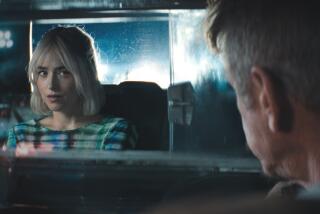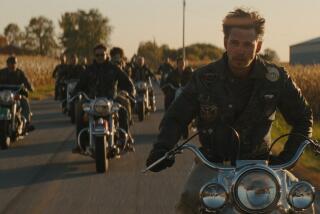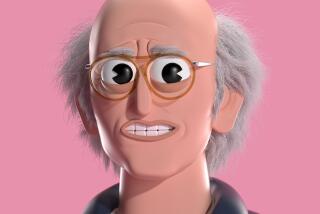MOVIE REVIEW : A RAMBUNCTIOUS RIDE WITH ‘MY CHAUFFEUR’
- Share via
“My Chauffeur” (citywide) is a rambunctious little comedy that tries to mix the goofy savoir-faire of the ‘30s Hollywood screwballers with the brash, bare-skinned, four-letter glitz of the ‘80s sex farce.
It’s about a slightly flaky Angeleno, Casey Meadows, who--through an unseen benefactor’s machinations--becomes the only female limousine driver in the staid Brentwood Limousine agency: a company with a fleet of Rolls- Royces and a staff of surly male chauvinists.
In short order, the indomitable kook Casey manages to pique or beguile most of her associates, transport a series of outrageous customers and become erotically entangled with her benefactor’s son, Battle Witherspoon (a real screwball moniker).
The film’s an odd mix. The opening--with its gleaming cinematography and satiric, measured line readings--suggests Hal Ashby’s “Harold and Maude.” After that, writer-director David Beaird seems to be cross-breeding “Nothing Sacred” and “His Girl Friday” with “Tomboy” and “Police Academy.” It doesn’t really jell, probably because screwball comedies worked not out of license but repression: that effervescent imbalance as they skated on the edge of ribaldry; the sly ways they circumvented the newly adopted Hays Code, suggesting what they couldn’t show, hinting at the sex lives of the rich and irresponsible.
Comedy depends on tone and timing--and the best parts of “My Chauffeur” have them. The weaker parts . . . well, that’s another story. Like most of the movies being made these days, “My Chauffeur” isn’t exactly original, and a lot of it is pitched toward the lower common denominators: crudeness, lewdness, flashy vulgarity.
But it’s not a movie you can dismiss easily. It’s cute and high-spirited, and it shows some talent and verve. Watching it, you feel that Beaird is capable of something really good; even when his material goes stale and tasteless, there’s a joie de vivre in his direction.
The story isn’t much, and it hasn’t been structured exactly right. (When Penn and Teller come on to do their “con man-silent stooge” shtick , it’s too late in the movie and, good as they are, it seems too much a set piece.) The plot contrivances are so bald they’re devoid of surprise. But still, the cast plays with some edge and glitter, a sense of fun you don’t usually find in movies like this. Beaird sometimes catches one aspect of the comedies he’s trying to copy: that vaguely alcoholic giddiness they induced, that whacked-out, anything-goes charm.
Mostly, the charm comes from the actors. They make a sprightly ensemble: Penn and Teller, E. G. Marshall, Sean McClory, Howard Hesseman, Julius Harris and the others. And a lot of it comes from the movie’s adorable heroine, Deborah Foreman (of “Valley Girl” and “Real Genius”). She has the kind of sunny, spunky insouciance that melts hearts; her best moments suggest a New Wave Carole Lombard crossed with early Shirley MacLaine.
More to Read
Only good movies
Get the Indie Focus newsletter, Mark Olsen's weekly guide to the world of cinema.
You may occasionally receive promotional content from the Los Angeles Times.










